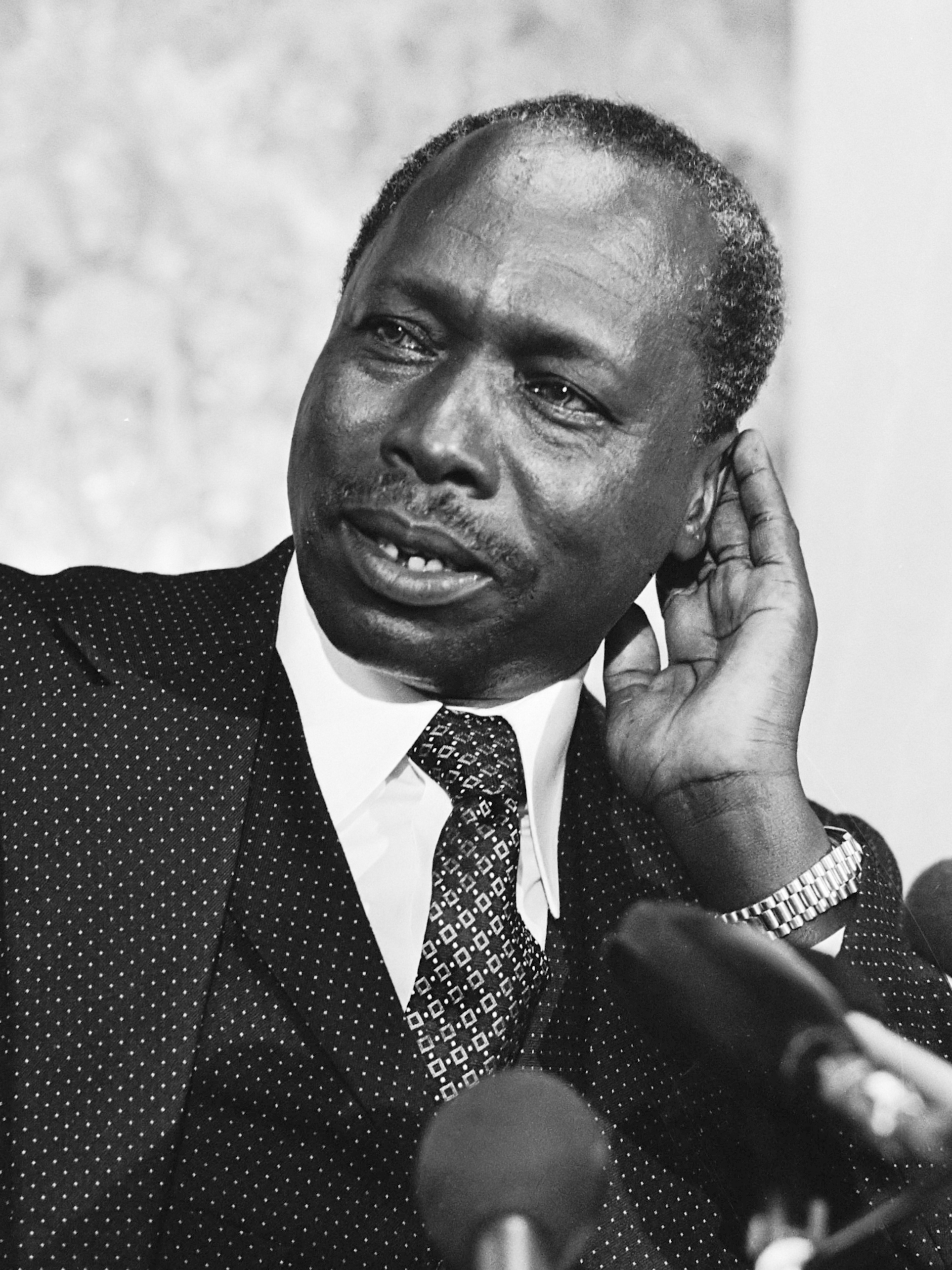Daniel arap Moi
 Daniel Toroitich arap Moi ( ; 2 September 1924 – 4 February 2020) was a Kenyan politician who served as the second president of Kenya from 1978 to 2002. He is the country's longest-serving president to date. Moi previously served as the third vice president of Kenya from 1967 to 1978 under President Jomo Kenyatta, becoming the president following the latter's death.
Daniel Toroitich arap Moi ( ; 2 September 1924 – 4 February 2020) was a Kenyan politician who served as the second president of Kenya from 1978 to 2002. He is the country's longest-serving president to date. Moi previously served as the third vice president of Kenya from 1967 to 1978 under President Jomo Kenyatta, becoming the president following the latter's death.Born into the Tugen sub-group of the Kalenjin people in the Kenyan Rift Valley, Moi studied as a boy at the Africa Inland Mission school before training as a teacher at the Tambach teachers training college, working in that profession until 1955. He then entered politics and was elected a member of the Legislative Council for Rift Valley. As independence approached, Moi joined the Kenyan delegation which travelled to London for the Lancaster House Conferences, where the country's first post-independence constitution was drafted. In 1960, he founded the Kenya African Democratic Union (KADU) as a rival party to Kenyatta's Kenya African National Union (KANU). Following independence in 1963, Kenyatta who became Prime Minister and later President of the new nation, convinced Moi to merge the two parties. Kenyatta appointed Moi to his government in 1964 and then promoted him to vice-president in 1967. Despite opposition from a Kikuyu elite known as the Kiambu Mafia, Kenyatta retained Moi as his Vice President. Moi took over as president when Kenyatta died in 1978.
Initially popular both nationally and in Western countries, who saw his regime as countering against influences from the Eastern Bloc-aligned governments of Ethiopia and Tanzania, Moi's popularity fell around 1990 as the economy stagnated after the end of the Cold War. Following the agitation and external pressure, he was forced to allow multiparty elections in 1991.He then led his party, KANU, to victory in the 1992 and 1997 elections, both of which have generally been regarded as neither free nor fair by independent observers. Constitutionally barred from seeking a third term, Moi chose Uhuru Kenyatta as his successor, but Kenyatta was defeated by opposition leader Mwai Kibaki in the 2002 general election, and Kibaki succeeded Moi as president. Kenyatta would eventually win the presidency in the 2013 election.
Moi's regime was deemed dictatorial especially before 1992 when Kenya was a one-party state. Human rights organisations such as Amnesty International, as well as a special investigation by the United Nations, accused Moi of human rights abuses during his presidency. Inquiries held after the end of his presidency found evidence that Moi and his sons had engaged in significant levels of corruption, including the 1990s Goldenberg scandal. Provided by Wikipedia
-
1by Moi, Daniel Arap, 1924-, Moi, Daniel Arap, 1924-, Moi, Daniel Arap, 1924-2020, Moi, Daniel Arap, 1924-2020
Published 1997
Book -
2
-
3
-
4
-
5
-
6
-
7by Khama, Seretse, Sir, 1921-1980Other Authors: “...Moi, Daniel Arap, 1924-2020...”
Published 1970
Book -
8
-
9
-
10
-
11
-
12Published 1994Other Authors: “...Moi, Daniel Arap, 1924-2020...”
This item is not available through BorrowDirect. Please contact your institution’s interlibrary loan office for further assistance.Audio Book -
13Published 1994Other Authors: “...Moi, Daniel Arap, 1924-2020...”
This item is not available through BorrowDirect. Please contact your institution’s interlibrary loan office for further assistance.Audio Book -
14Published 1989Other Authors: “...Moi, Daniel Arap, 1924-2020...”
This item is not available through BorrowDirect. Please contact your institution’s interlibrary loan office for further assistance.Audio Book